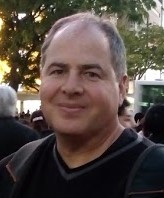Michael J. Socolow
Michael J. Socolow, Ph.D.
Professor
Department of Communication and Journalism
108 Corbett Hall
University of Maine
Orono, ME 04469
Phone: (207) 581-1942
E-Mail: michael.socolow@maine.edu
Fax: (207) 581-1286
Michael J. Socolow is a media historian whose research centers upon America’s original radio networks in the 1920s and 1930s. His scholarship on media history has appeared in Journalism & Mass Communication Quarterly, The Journal of Broadcasting and Electronic Media, Technology & Culture, and other scholarly journals. He is the author of Six Minutes in Berlin: Broadcast Spectacle and Rowing Gold at the Nazi Olympics (Urbana: University of Illinois Press, 2016). He was awarded the 2018 Broadcast Historian Award by the Library of American Broadcasting Foundation and the Broadcast Education Association for Six Minutes in Berlin. In 2019, Professor Socolow was a Senior Fulbright Research Scholar at the News & Media Research Centre at the University of Canberra [Australia]
He is also a former broadcast journalist who has worked as an Assignment Editor for the Cable News Network and as an information manager for the host broadcast organizations at the Barcelona, Atlanta, and Sydney Olympic Games. He has written pieces on media regulation and media history for The New York Times, Washington Post, Slate, Politico, Columbia Journalism Review, the Chronicle of Higher Education’s Chronicle Review, and other journalistic outlets. In the Department of Communication and Journalism, he teaches CMJ 211: Journalism Studies I, CMJ 237: Journalism Across Platforms, CMJ 380: Advertising, Media & Society, CMJ 489: Seminar in Media Ethics, CMJ 520: Media History, CMJ 525: Propaganda and Political Persuasion, and other courses.
From 2020 to 2022, Dr. Socolow was Director of the McGillicuddy Humanities Center at the University of Maine.
For more on Professor Socolow’s scholarship check out his Google Scholar profile. His Open Researcher and Contributor ID (ORCID) page can be found here. He tweets at @michaelsocolow.
Recent Scholarship:
“Lawyers, Los Angeles and Le Show: On Covering O.J. Simpson While Listening to Le Show, 1994 – 1995,” Resonance (2025) 6 (2): 200–208. DOI: https://doi.org/10.1525/res.2025.6.2.200
“Radio News in American Journalism History,” in Garza, M.M., Fuhlhage, M., & Lucht, T. (Eds.). (2023). The Routledge Companion to American Journalism History (1st ed.). (Routledge, 2023). DOI: https://doi.org/10.4324/9781003245131
“Commercial Television’s Secret Goldmine: The Hidden Riches Generated by U.S. Network TV News, 1960–1970,” Journalism History 49 (2) (2023), 91-94. DOI: 10.1080/00947679.2023.2195346.
‘Australians are the Greatest Sport Loving People in the World’: Sport Broadcasting’s Role in the Development of National Radio in Australia, 1925–1935,” Media History 28 (4): 510-528. DOI: 10.1080/13688804.2021.1929132
“Comparing Australian, British, Canadian, and U.S. Broadcasting: The 1934 Radio Reports Compiled by Australian Broadcasting Commissioner E.M.R. Couchman,” Journal of Radio & Audio Media, 28 (1) (2021), 86-106. DOI: 10.1080/19376529.2020.1844204
““Radio’s Waves of History: Media Activism and National Radio Network Historiography in the United States,” Journal of Radio and Audio Media 27 (2) (2020): 208-233.
“The Prohías Paradox: The Cold War Specificity and Existential Universality of ‘Spy vs. Spy’” in John Bird and Judith Yaross Lee eds. Seeing Mad: Essays on Mad Magazine’s Humor and Legacy (Columbia, MO: University of Missouri Press, 2020): 177-192.
Recent Reviews and Media Commentary:
“When the Humanities Kept Us Sane,” Inside Higher Ed, March 12, 2025.
“John E. Mack and the Unbelievable UFO Truth,” Los Angeles Review of Books, September 21, 2024.
“How you can tell propaganda from journalism − let’s look at Tucker Carlson’s visit to Russia,” The Conversation, February 22, 2024.
“Requiem for a Redneck: Mojo Nixon, 1957–2024” Reason, February 9, 2024.
“Taken Hostage,” Journal of American History 110 (1):189–191 [Film Review].
“Of Course Trump Should Be Interviewed on TV!” Slate, May 11, 2023.
“Saving Broadcasting’s Past for the Future” The Conversation, April 27, 2023.
“Don’t Trust the News Media? That’s Good,” The Conversation, March 14, 2023.
Interviews:
“In 1968, the DNC was also held in Chicago. That’s where the similarities end,” National Public Radio “Weekend Edition,” August 3, 2024.
“Q&A: The media historian Michael Socolow on the limits of history in this moment,” Columbia Journalism Review, July 24, 2024.

